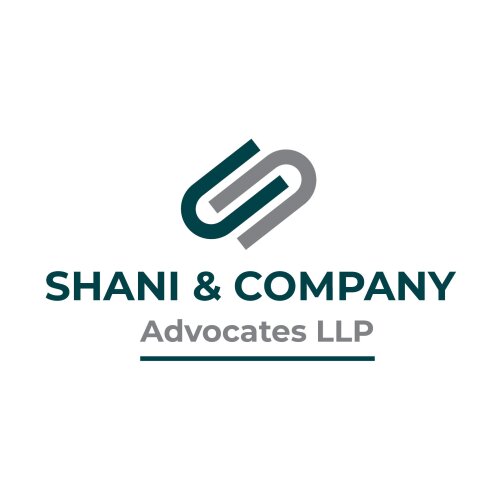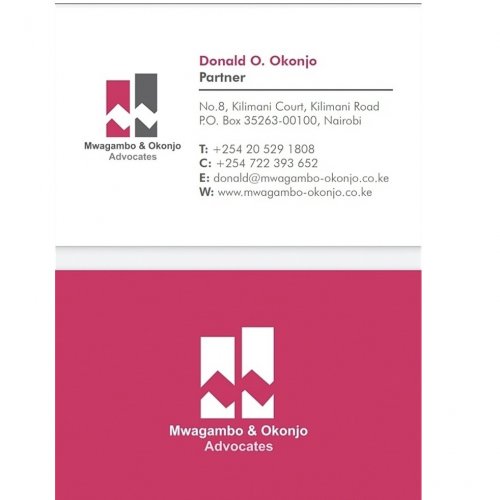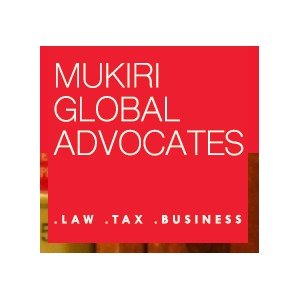Best Labor Law Lawyers in Kenya
Share your needs with us, get contacted by law firms.
Free. Takes 2 min.
Or refine your search by selecting a city:
List of the best lawyers in Kenya
About Labor Law in Kenya
Labor Law in Kenya is governed primarily by the Employment Act, the Labor Relations Act, the Labor Institutions Act, and other relevant statutes. These laws regulate the relationship between employers and employees, ensuring fair treatment, safe working conditions, and equitable compensation. They also outline the rights and obligations of both parties and provide mechanisms for resolving workplace disputes. Kenya is committed to aligning its labor laws with international labor standards, which aim to protect workers from exploitation and discrimination.
Why You May Need a Lawyer
There are various situations where you might require legal assistance in the field of Labor Law. Common scenarios include:
- Unfair Dismissal: If you believe you have been dismissed unfairly or without proper cause, a lawyer can help you understand your rights and options for recourse.
- Workplace Discrimination: Instances of discrimination based on race, gender, religion, or disability may necessitate legal action to seek justice.
- Contractual Disputes: Issues related to employment contracts, including breaches or changes in terms, often require legal interpretation.
- Non-payment of Wages: If an employer fails to pay wages or benefits owed, legal intervention may be necessary to resolve the issue.
- Workplace Safety Issues: Failure to comply with health and safety regulations may warrant legal actions to ensure a safe working environment.
Local Laws Overview
Kenya’s labor laws cover several critical areas, including:
- Employment Contracts: Every employment must be backed by a contract detailing the terms and conditions of employment.
- Wage Guidelines: The Minimum Wage Regulations stipulate the minimum wage rates, ensuring employees receive fair compensation.
- Working Hours and Leave: The laws regulate working hours, overtime, and provide for annual leave, maternity leave, and sick leave entitlements.
- Termination of Employment: The law outlines valid reasons for termination and the procedural fairness required in doing so.
- Dispute Resolution: The Industrial Court provides a platform for resolving disputes between employees and employers.
Frequently Asked Questions
What is the minimum wage in Kenya?
The minimum wage in Kenya varies depending on factors such as the region and job category. It is reviewed regularly by the government to reflect economic changes.
What should be included in an employment contract?
An employment contract should include details such as job title, job description, pay, hours of work, leave entitlements, and any other relevant terms and conditions agreed upon by both parties.
How can an employee challenge unfair dismissal?
An employee can file a complaint with the relevant labor office or seek representation from a lawyer to file a case with the Industrial Court if they believe the dismissal was unfair.
Are employers required to provide health insurance?
While employers in Kenya are not mandated to provide private health insurance, they must adhere to the National Hospital Insurance Fund (NHIF) contributions for their employees.
What is considered workplace discrimination?
Workplace discrimination occurs when an employee is treated unfairly based on race, gender, age, religion, disability, or other protected characteristics under the law.
How is overtime compensable in Kenya?
Overtime is usually compensable at one and a half times the employee's normal hourly wage for work beyond the stipulated working hours, according to the Employment Act.
What are the rights of employees under maternity leave?
Female employees in Kenya are entitled to three months of maternity leave with full pay, which cannot be forfeited if not taken.
Can an employer change an employment contract unilaterally?
An employer cannot unilaterally change an employment contract without consulting and obtaining consent from the employee.
What is the procedure for handling grievances in the workplace?
Workplace grievances should first be addressed internally through established procedures like discussions with supervisors or HR before resorting to formal complaints.
What recourse does an employee have if wages are not paid?
An employee can report the matter to the labor office or seek legal advice to pursue recovery through the industrial courts.
Additional Resources
For more information or assistance with labor law issues, consider consulting the following resources:
- The Ministry of Labor and Social Protection: Offers guidance and services related to labor laws and workers' rights.
- The Federation of Kenyan Employers (FKE): Provides resources for employers on best practices and compliance.
- COTU (Central Organization of Trade Unions): Assists workers in understanding their rights and accessing legal support.
- The Industrial Court: Handles cases involving labor disputes between employers and employees.
Next Steps
If you require legal assistance in labor law matters, consider the following steps:
- Consult with a licensed labor lawyer who can provide personalized advice tailored to your situation.
- Gather and organize all relevant documents and correspondence related to your issue.
- Consider mediation as a first step to resolve disputes amicably before pursuing court action.
- Visit your local labor office for guidance and support in filing a formal complaint.
Lawzana helps you find the best lawyers and law firms in Kenya through a curated and pre-screened list of qualified legal professionals. Our platform offers rankings and detailed profiles of attorneys and law firms, allowing you to compare based on practice areas, including Labor Law, experience, and client feedback.
Each profile includes a description of the firm's areas of practice, client reviews, team members and partners, year of establishment, spoken languages, office locations, contact information, social media presence, and any published articles or resources. Most firms on our platform speak English and are experienced in both local and international legal matters.
Get a quote from top-rated law firms in Kenya — quickly, securely, and without unnecessary hassle.
Disclaimer:
The information provided on this page is for general informational purposes only and does not constitute legal advice. While we strive to ensure the accuracy and relevance of the content, legal information may change over time, and interpretations of the law can vary. You should always consult with a qualified legal professional for advice specific to your situation.
We disclaim all liability for actions taken or not taken based on the content of this page. If you believe any information is incorrect or outdated, please contact us, and we will review and update it where appropriate.
Browse labor law law firms by city in Kenya
Refine your search by selecting a city.

















